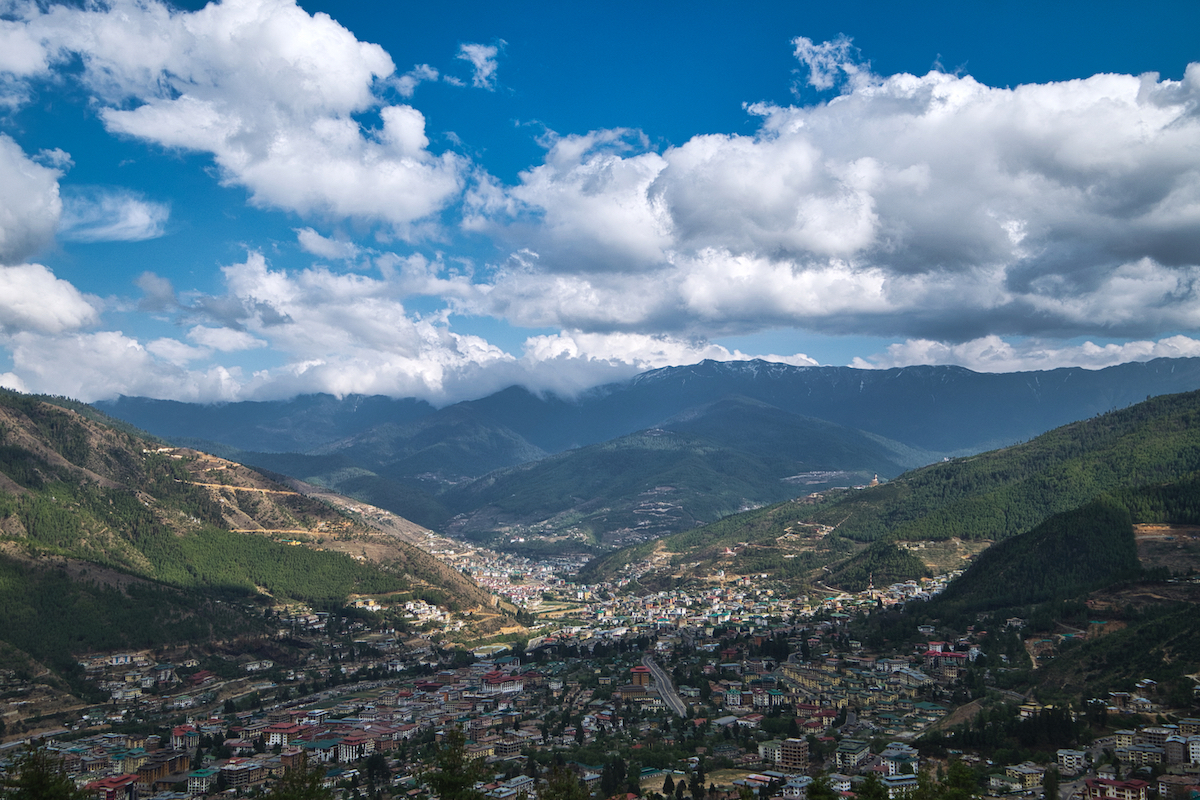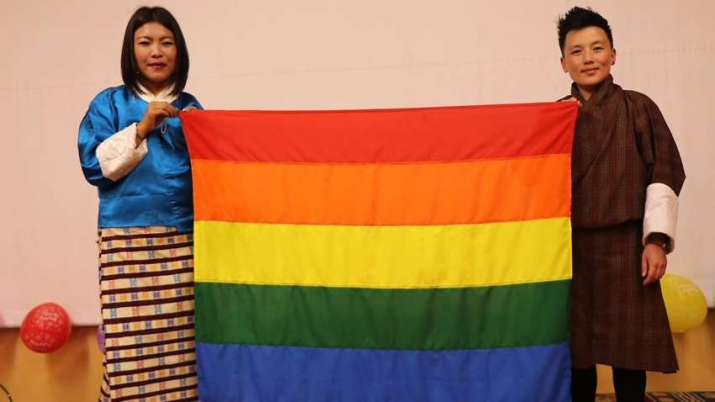NEWS
Buddhist Kingdom of Bhutan Moves to Decriminalize Homosexuality
 Overlooking the Bhutanese capital Thimphu. Photo by Craig Lewis
Overlooking the Bhutanese capital Thimphu. Photo by Craig Lewis
Bhutan’s Legislative Committee, the lower house of the parliamentary National Assembly, late on Friday voted overwhelmingly to decriminalize homosexuality, as the tiny Himalayan kingdom moves toward becoming the latest Asian nation to officially adopt a more open and accepting attitude toward same-sex relationships.
The vote, which received only a single vote cast in opposition out of a total of 44, with five abstentions, repeals two sections of the country’s 2004 criminal code that classify “unnatural sex” as illegal. The bill will be put before the National Assembly’s upper house, or National Council during its winter session in six month’s time for ratification before it is sent to the king for royal approval, The Bhutanese newspaper reported via its twitter account.
In May, Taiwan became the first Asian government to legalize same-sex marriage, while India cast out centuries-old legislation prohibiting gay sex in September last year. Hong Kong, where Buddhistdoor Global is based, last month abolished or revised several offenses that criminalized sex between men, yet continues to resist calls to provide equal rights for same-sex unions.
Breaking: National Assembly has passed the Penal Code Amendment Bill 2019 with 38 yes votes 5 absentations & 1 vote against it.
— The Bhutanese (@thebhutanese) June 10, 2019
This means that among others the removal of sections 213 & 214 criminalizing ‘unnatural sex’ or homosexuality is formally approved by the NA.
Bhutan’s Finance Minister Namgay Tshering had originally proposed repealing the legislative provisions against homosexuality, saying, “My primary reason is that this section is there since 2004 but it has become so redundant and has never been enforced. It is also an eyesore for international human rights bodies.” (The Bhutanese)
The minister expressed optimism that the upper house of parliament would back the lower house decision, noting, ”There is a high degree of acceptability of the LGBT community in our society.” (Channel NewsAsia)
According to section 213 of the Bhutan Penal Code 2004: “A defendant shall be guilty of the offense of unnatural sex, if the defendant engages in sodomy or any other sexual conduct that is against the order of nature,” while section 214 states: “The offense of unnatural sex shall be a petty misdemeanor.”
Nestled in the foothills of the Himalayan mountain range, and sandwiched between two political and economic heavy hitters India and China, Bhutan is the world’s last remaining Vajrayana Buddhist country. The ancient spiritual tradition is embedded in the very consciousness and culture of this remote land, where it has flourished with an unbroken history that dates back to its introduction from Tibet by Padmasambhava, also known as Guru Rinpoche, in the eighth century.
The lower house decision was lauded my human rights organizations and activists as an important step forward by Bhutan toward helping to ensure social equality.
“Taking steps to end the criminalization of same sex relationships is a welcome and progressive step by Bhutan,” said Meenakshi Ganguly, South Asia director at New York-based Human Rights Watch. (Al Jazeera)
“A lot of us cried. We are a small and marginalized community and when our rights are discussed in parliament, it makes us extremely happy,” said Tashi Tsheten, director of the LGBT+ activist group Rainbow Bhutan. “The biggest advantage we have with our current government is that they have already worked with us and they are well aware of our issues. This is our first journey towards equality.” (France 24, Reuters)
Tashi noted that while transgendered people were generally accepted by Bhutanese society, especially in rural areas, discrimination still exists, particularly in schools. “There are lots of barriers and our education system does not understand LGBT,” Tashi explained, adding that most LGBT youths dropped out of school early. (Al Jazeera)
 Members of the the LGBT+ activist group Rainbow Bhutan. From facebook.com
Members of the the LGBT+ activist group Rainbow Bhutan. From facebook.comAlmost 75 per cent of Bhutan’s population of some 750,000 people identify as Buddhists, according to data for 2010 from the Washington, DC-based Pew Research Center, with Hinduism accounting for the majority of the remainder. Most of Bhutan’s Buddhists follow either the Drukpa Kagyu or the Nyingma schools of Vajrayana Buddhism. Renowned for its “Gross National Happiness” approach to economic development, which prioritizes societal happiness, Bhutan held its first elections as a constitutional monarchy in 2008.
See more
National Assembly takes a big step towards decriminalizing Homosexuality (The Bhutanese)
Bhutan's lower house of parliament votes to decriminalise homosexuality (Reuters)
Rights group hails Bhutan's move to decriminalise homosexuality (Al Jazeera)
Bhutan gays celebrate after homosexuality decriminalised (France 24)
Bhutan gays celebrate after homosexuality decriminalised (Channel News Asia)
Bhutan starts process to decriminalize homosexuality (Gay Star News)
Bhutan's Parliament Decriminalises Homosexuality, The LGBTQ Community Celebrates (ScoopWhoop)
Related news from Buddhistdoor Global
Buddhist Kingdom of Bhutan Hosts Third International Vajrayana Conference
BBC Names Dr. Tashi Zangmo of the Bhutan Nuns Foundation among 100 Most Influential Women of 2018
Bhutan, the World’s Only Carbon-negative Nation, Sets an Example of Environmental Stewardship for a Planet Grappling with Climate Change
Buddhists Lend Support as Thousands Celebrate LGBT Rights in Seoul
Buddhist Temple in Tokyo Offers Graves for LGBT Couples
Related features from Buddhistdoor Global
My Story: Walking the Path of a Female Monastic in Bhutan
Changing Mindsets: Tashi Zangmo and the Bhutan Nuns Foundation
Happiness Before Profit: Bhutan Seeks to Redefine Business Using Buddhist Values
A Manifestation of Profound Wisdom and Compassion—Remembering Dilgo Khyentse Rinpoche
An Agent of Change: Empowering Bhutanese Nuns














